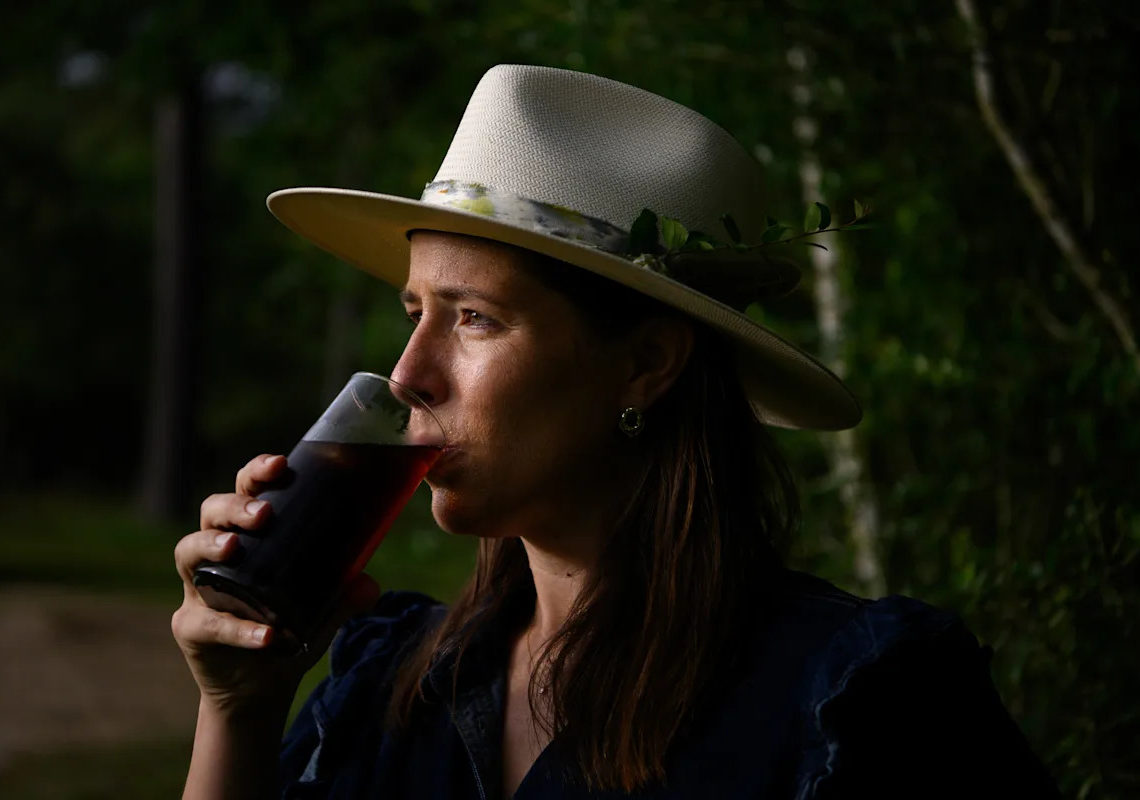When the Sons of Liberty dumped over 92,000 pounds of tea into the Boston Harbor in protest of the passage of the wildly unpopular Tea Act of 1773, colonial Americans knew the political performance wouldn’t force them to kick their caffeine habit. While they still hadn’t found a way to successfully cultivate their beloved Camellia sinensis – the scientific name for the tea plant- on American soil, they had another locally grown option: yaupon.
Long used by Indigenous groups across the Southern United States, yaupon is North America’s only native caffeinated plant. Known by many Indigenous and colonized names, including cassina, asi, Carolina tea and Christmas berry, the yaupon plant is a landrace, evergreen holly variety that can grow up to 30 feet tall, appearing from North Carolina to East Texas. But even as it grows right under their noses and in their backyards, most Americans have probably never heard about yaupon.
That may start to change. Thanks to President Donald Trump’s tariffs, the modern-day yaupon industry is ready and waiting for the plant’s potential resurgence.
Two and a half centuries ago, yaupon became part of a political movement. The Townshend Revenue Acts, which taxed a variety of common imports in the 1770s and allowed the British Parliament to meddle with the free market, brought colonial unrest to a boiling point. In that era of political boycott, colonists turned to tea alternatives made with a variety of herbs, fruits and indigenous plants, including yaupon. These “liberty teas” proved perfectly acceptable substitutes, until the American Revolution ended, the global tea trade returned, and yaupon was suddenly out of style again.
Starting in April 2025, the Trump administration rolled out a slew of steep protective tariffs on nearly all goods imported to the United States, including tea, which carried its highest tariff rate since the Tea Act of 1773. Although modern-day America is usually considered a coffee-drinking nation, we also import hundreds of millions of dollars worth of tea each year, largely from countries such as China and India. The United States can’t grow tea to the scale it consumes.
In a letter to Trump, Secretary of State Marco Rubio and other officials involved in trade decisions, Peter Goggi, president of the Tea Association of the USA, expressed deep concern over the impact of tariffs. “The United States is not a tea producing nation,” Goggi writes. “There is no commercially grown tea that requires protection via tariffs, nor are there any tea-related farm-based jobs that would be protected by these tariffs.”
Meanwhile, with such a steady, sustainable supply grown right here in the United States, yaupon stands to be the only tariff-proof source of caffeine for American consumers. “When I saw the news around tea and coffee,” says Christine Folch, cultural anthropologist at Duke University and author of “The Book of Yerba Mate,” “I thought, maybe this is yaupon’s moment in the sun.”
The modern-day yaupon industry includes a small, tight-knit group of farmers, producers and wild harvesters, known internally as “yauponers.”
Abianne Falla, owner of CatSpring Yaupon in Cat Spring, Texas, and founder of the American Yaupon Association, sources native-grown yaupon through partnerships with local ranches. “It’s a 20-million-acre problem in Texas,” says Falla, referring to the belief held by many Texas landowners that yaupon is a nuisance in need of fixing. Founded in 2011, CatSpring was one of the earliest yaupon producers on the market, offering dark and green roasts (similar to black and green tea flavor profiles) in loose leaf and bagged options.
A few states over in Crescent City, Florida, Yaupon Brothers uses more traditional agricultural methods to grow yaupon on a 124-year-old organic citrus farm (the oldest in the state). Much like other crops, their yaupon grows in tidy rows, which helps the company scale production and maintain some control over the naturally occurring plant.
Yaupon Brothers founders Bryon and Kyle White found that the methodologies for growing yerba mate, another caffeinated Ilex plant native to South America, work similarly for its botanical cousin yaupon. While Yaupon Brothers and other commercial farmers do not grow yerba mate in the United States, they rely on similar pruning and harvesting techniques. Their yaupon trees are capped at six to seven feet and harvested three times a year, after which it “comes back in a matter of months,” says White.
Much like traditional tea, yaupon tea is made with dried yaupon leaves that are chopped and roasted to suit different tastes, including the familiar green and black flavor profiles of the tea-drinking world. Unlike other traditional tea importers, Harney & Sons has embraced yaupon and sources the raw ingredient from CatSpring Yaupon. The company sells a loose-leaf blend as well as a ready-to-drink bottle sold exclusively at the popular salad chain Sweetgreen.
But winning over the general tea-drinking public remains an issue for yaupon farmers and importers who might add yaupon to their offerings. “America is an on-the-go culture,” says Ahmed Rahim, founder of traditional tea importer Numi Tea, adding that he’s still “trying to find ways to get the American mindset wrapped around tea.” Despite yaupon’s long history in the region, a large part of the industry still revolves around educating the public about the plant and how to drink it.
For many generations, yaupon was considered invasive and burned down to its hearty roots when land needed clearing. Its Westernized botanical name, Ilex vomitoria, has also spurred erroneous beliefs that yaupon induces vomiting if consumed and has flattened interpretations to the indigenous rituals to which it was once a central ingredient.
The threat of tariffs spurred small-scale yaupon farmer Crystal Stokes to pivot to education. Through her organization Project CommuniTea, Stokes travels around and teaches her Richmond community about the history and benefits of yaupon, plant identification, and how to grow yaupon at home. “I knew that changes in administration were coming and that consumers would be less likely to purchase a plant beverage that most would be trying for the first time,” says Stokes.
Despite the tariffs, traditional tea purveyors aren’t overly worried. According to Paul Harney of Harney & Sons, “there’s always some degree of chaos. It’s always something, the pandemic, shipping, something.” The tariffs motivated Harney & Sons to find tea grown in countries with fewer trade issues, such as Mozambique and Kenya.
For Numi, Rahim sources from dozens of countries, and much of the company’s production process is in Canada. Numi is the largest fair trade importer of tea and herbs in the United States, but Rahim says he’s not panicked or anxious about the impact of tariffs and plans to “wait and see what’s going to happen.”
Darren Hartford, the owner of Oliver Pluff & Co., which sells history-inspired beverages, including “the story of what was dumped in the Boston harbor,” is staying optimistic. The company is set to open its retail location in Charleston this summer and is busy prepping for collaborations related to the upcoming 250th anniversary of the founding of America. Understanding its historical relevance, Oliver Pluff & Co. tried yaupon, but it turned out to be “a fringe item.” After the current tariffs started, another yaupon farmer reached out to Hartford, curious if he wanted to now incorporate more of the tea alternative in his offerings. Yaupon was never a big seller for Hartford, who remains hesitant to take a chance on the tea alternative again during a tumultuous market.
While the yaupon industry’s raw material is not impacted by tariffs, some producers’ packaging and other materials are sourced from tariff-heavy regions. Most businesses, especially small ones, “can’t simply decouple from a global supply chain,” explains White. After the first wave of tariffs went into effect, the price of Yaupon Brothers’ Chinese-made packaging doubled overnight.
Nonetheless, the tense economic situation has spurred the company to pivot to find new packaging, switching to American-made materials, which they hope will eventually reduce consumer costs overall. CatSpring Yaupon already used packaging sourced from U.S.-based manufacturers, but is using this moment to rebrand and double down on its messaging that yaupon is made in America.
With a growing push for American-grown products and production, the yaupon industry is poised for growth.
CatSpring Yaupon has added manufacturing jobs back to their rural community in Texas and sends out so much mail they were able to keep their local post office open. CatSpring Yaupon collaborates with other small companies and restaurants across the nation. “Anytime we’re added to the menu, we’re replacing an imported product,” says Falla. “On paper, we’re perfect for this administration.”
As Duke University’s Folch puts it, yaupon could benefit from the current turmoil. “The tariffs give us an opportunity to ask really deep questions about who we are and what we bring to the table,” she said.
If yaupon is indeed able to navigate the new realities of an American-made tea culture and, once again, help us rethink what “made in America” really means, it would be an epic, 250-year comeback.
Related Content
He may have stopped Trump’s would-be assassin. Now he’s telling his story.
He seeded clouds over Texas. Then came the conspiracy theories.
How conservatives beat back a Republican sell-off of public lands
The post Tariffs give the U.S.’s only native caffeinated plant a shot at stardom appeared first on Washington Post.



